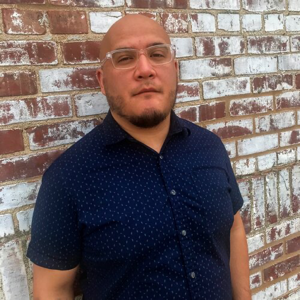
Dr. Ángel Garcia is Assistant Professor in the English Department at the University of Illinois at Urbana-Champaign. He earned a PhD from the University of Nebraska, Lincoln and an M.F.A. from the University of California-Riverside.
He is the author of Teeth Never Sleep, winner of a 2018 CantoMundo Poetry Prize published by the University of Arkansas Press, winner of a 2019 American Book Award, finalist for a 2019 PEN America Open Book Award, and finalist for a 2020 Kate Tufts Discovery Award. Professor Garcia Ángel is also the cofounder of the non-profit organization, Gente Organizada, which educates, empowers, and engages communities through grassroots organizing.

Watch Professor Garcia read his poem, “Dina Olimpico” on our Instagram here. He reflects on how Natasha Trethewey and Geffrey Davis inspired his poem below:
What I love and what I want to honor in Natasha Trethewey’s poem “The Southern Crescent” from her book Native Guard and in Geffrey Davis’ poem “King Country Metro” from his book, is their recognition of ancestry and how one arrives in a particular place. Thinking about my own family, I wanted to document the seemingly innate need for one to return home and also point to some of the constraints and challenges one might face in doing so. To further complicate the idea of returning, I wanted to acknowledge the long familial history of moving from place to place across several generations.
But another important way to think about ancestry is poetic ancestry. I wanted to honor my own lineage of poetic ancestry, particularly Black poets like Natasha Tretheway and Geffrey Davis, who by writing about their own migratory experiences have inspired and influenced me to write about the migrations of my own family. National Poetry Month, with the availability of so many reading, events, and poems, is a wonderful time for students and poets to discover their own poetic ancestry, digging through books, journals, and archives to discover poems that speak to their experiences. Going one step further, we can continue that lineage by then writing imitation poems based on the original poems of our poetic ancestors.

